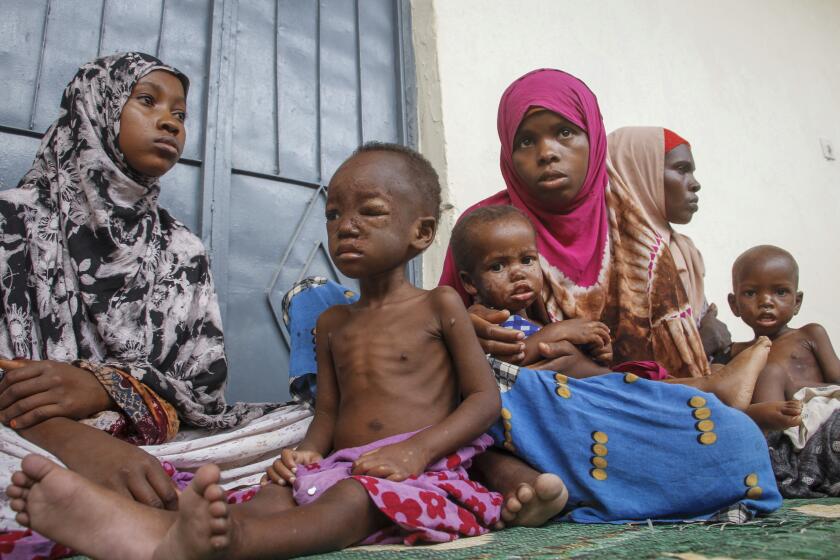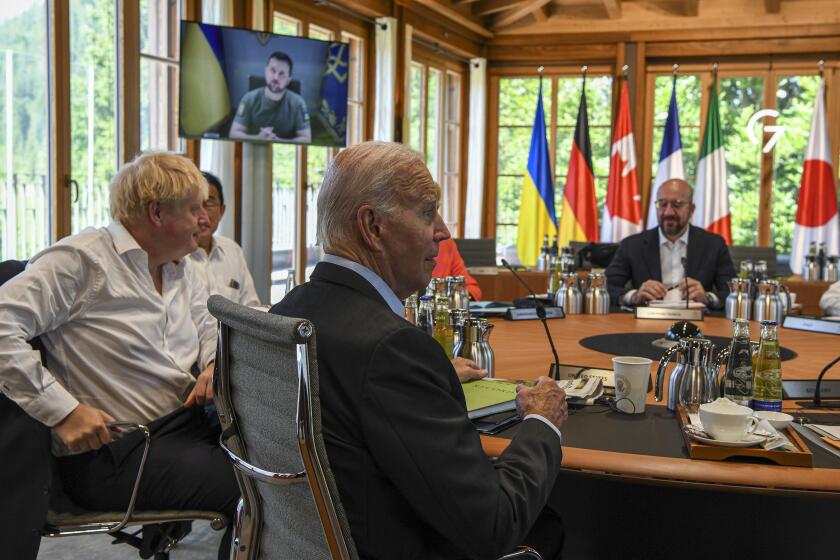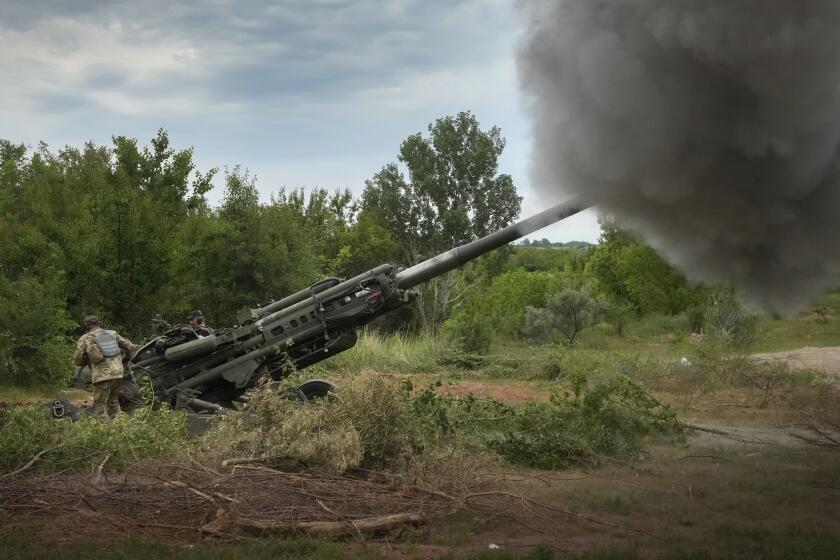At least 16 killed when Russian missile hits mall, Ukraine news agency says; rescuers searching rubble

Ukrainian officials say many civilians are feared killed or injured after a Russian rocket strike hits a shopping mall in the city of Kremenchuk.
- Share via
KREMENCHUK, Ukraine — Russian long-range bombers struck a crowded shopping mall in Ukraine’s central city of Kremenchuk with a missile on Monday, raising fears of what President Volodymyr Zelensky called an “unimaginable” number of victims in “one of the most daring terrorist attacks in European history.”
Zelensky said that many of the more than 1,000 civilians in the mall managed to escape. Giant plumes of black smoke, dust and orange flames emanated from the wreckage, with emergency crews rushing in to search broken concrete and metal for victims and put out fires. Onlookers watched in distress at the sight of how an everyday activity such as shopping could turn into a horror.
The casualty figures were difficult to determine as rescuers searched the smoldering rubble. The regional governor, Dmytro Lunin, said at least 15 people were dead and more than 40 wounded. The Unian news agency reported 16 dead.
Soldiers worked into the night to lug sheets of twisted metal and broken concrete, as one drilled into what remained of the shopping center’s roof. Drones whirred above clouds of dark smoke still emanating from the ruins several hours after the fire had been put out.
“We are working to dismantle the construction so that it is possible to get machinery in there since the metal elements are very heavy and big, and disassembling them by hand is impossible,” said Volodymyr Hychkan, an emergency services official.
At Ukraine’s request, the U.N. Security Council scheduled an emergency meeting in New York on Tuesday to discuss the attack.
In the first Russian government comment on the missile strike, the country’s first deputy permanent representative to the United Nations, Dmitry Polyansky, alleged multiple inconsistencies that he didn’t specify, claiming on Twitter that the incident was a provocation by Ukraine. Russia has repeatedly denied it targets civilian infrastructure, even though Russian attacks have hit other shopping malls, theaters, hospitals, kindergartens and apartment buildings.
The missile strike unfolded as Western leaders pledged continued support for Ukraine, and the world’s major economies got ready to pursue new sanctions on Russia, including a price cap on oil and higher tariffs on goods. Meanwhile, the U.S. appeared ready to respond to Zelensky’s call for more air defense systems, and NATO planned to increase the size of its rapid-reaction forces nearly eightfold — to 300,000 troops.
Zelensky stressed that the target presented “no threat to the Russian army” and had “no strategic value.” He accused Russia of sabotaging “people’s attempts to live a normal life, which make the occupiers so angry.”
In his nightly address, he said it appeared Russian forces had intentionally targeted the shopping center and added, “Today’s Russian strike at a shopping mall in Kremenchuk is one of the most daring terrorist attacks in European history.” He said Russia “has become the largest terrorist organization in the world.”
Russia has increasingly used long-range bombers in the war. Ukrainian officials said Russian Tu-22M3 long-range bombers flying over Russia’s western Kursk region fired the missile that hit the shopping center, as well as another that hit a sports arena in Kremenchuk.
The Russian strike carried echoes of attacks earlier in the war that caused large numbers of civilian casualties — such as one in March on a Mariupol theater where many civilians had holed up, killing an estimated 600, and another in April on a train station in eastern Kramatorsk that left at least 59 people dead.
“Russia continues to take out its impotence on ordinary civilians. It is useless to hope for decency and humanity on its part,” Zelensky said.
Kremenchuk Mayor Vitaliy Maletskiy wrote on Facebook that the attack “hit a very crowded area, which is 100% certain not to have any links to the armed forces.”
Leading foreign ministers meet to confront global food insecurity crisis, facing conflict, climate change and COVID. Millions could die.
The United Nations called the attack on the shopping center “deplorable,” stressing that civilian infrastructure “should never ever be targeted,” U.N. spokesman Stephane Dujarric said. Group of 7 leaders issued a statement late Monday condemning the attack and saying that “indiscriminate attacks on innocent civilians constitute a war crime. Russian President Putin and those responsible will be held to account.”
The attack came as Russia was mounting an all-out assault on the last Ukrainian stronghold in the eastern region of Luhansk, “pouring fire” on the city of Lysychansk from the ground and air, according to the local governor.
At least eight people were killed and more than 20 wounded in Lysychansk when Russian rockets hit an area where a crowd of people gathered to get water from a tank, Luhansk Gov. Serhiy Haidai said.
The eastern barrage was part of Russian forces’ intensified offensive aimed at wresting the eastern region of Donbas from Ukraine. Over the weekend, the Russian military and its local separatist allies forced Ukrainian government troops out of Lysychansk’s neighboring city, Severodonetsk.
To the west of Lysychansk on Monday, the mayor of the city of Slovyansk — potentially the next major battleground — said Russian forces fired cluster munitions on the city after dawn, including one that hit a residential neighborhood.
After Ukrainian President Volodymyr Zelensky asked G-7 leaders for new defense systems, President Biden said the U.S. would deliver.
Authorities say the number of dead and injured is still to be confirmed. The AP saw one fatality: A man’s body lay hunched over a car door frame, his blood pooling onto the ground from chest and head wounds.
The blast blew out most windows in the surrounding apartment blocks and the cars parked below, littering the ground with broken glass.
“Everything is now destroyed. We are the only people left living in this part of the building. There is no power,” said resident Valentina Vitkovska, who was in tears as she spoke about the blast. “I can’t even call to tell others what had happened to us.”
Before Monday’s attacks, at least six civilians were killed and 31 others injured as part of intense Russian shelling of various Ukrainian cities in the preceding 24-hour period — including Kyiv and major cities in the country’s south and east, according to Zelensky’s office. Shelling on Monday in Kharkiv, Ukraine’s second-largest city, killed at least five people and wounded 15.
Russian forces continued to target the key southern Black Sea port of Odesa. A missile attack destroyed residential buildings and wounded six people, including a child, Ukrainian authorities said.
Two major cities were on the brink in eastern Ukraine as a European Union body approved Ukraine’s candidacy for admission.
In Lysychansk, at least five high-rise buildings in the city and the last road bridge were damaged over the past day, Haidai said. A crucial highway linking the city to government-held territory to the south was rendered impassable by shelling.
The city had a prewar population of around 100,000, approximately one-tenth of whom remain.
Analysts say that Lysychansk’s location high on the banks of the Seversky Donets River gives a major advantage to the city’s Ukrainian defenders.
“It’s a very hard nut to crack. The Russians could spend many months and much effort storming Lysychansk,” said military analyst Oleh Zhdanov.
In other developments, in Germany’s Bavarian Alps, leaders of the Group of 7 countries unveiled plans to seek new sanctions and pledged to continue supporting Ukraine “for as long as it takes.”
In a joint statement on Monday after they held a session by video link with Zelensky, the leaders underlined their “unwavering commitment to support the government and people of Ukraine in their courageous defense of their country’s sovereignty and territorial integrity.”
Breaking News
Get breaking news, investigations, analysis and more signature journalism from the Los Angeles Times in your inbox.
You may occasionally receive promotional content from the Los Angeles Times.
Elsewhere, Washington was expected to announce the purchase of an advanced surface-to-air missile system for Ukraine.
In Brussels, NATO Secretary General Jens Stoltenberg announced the plans to greatly expand the alliance’s rapid-reaction forces as part of its response to an “era of strategic competition.” The NATO response force currently has about 40,000 soldiers.
NATO will agree to deliver further military support to Ukraine — including secure communication and anti-drone systems — when its leaders convene in Spain for a summit, Stoltenberg said.
Britain’s Defense Ministry said Russia is likely to rely increasingly on reserve forces in the coming weeks of the war.
Analysts have said a call-up of reservists by Russia could vastly alter the balance in the war but could also come with political consequences for Putin’s government.
More to Read
Sign up for Essential California
The most important California stories and recommendations in your inbox every morning.
You may occasionally receive promotional content from the Los Angeles Times.













